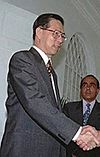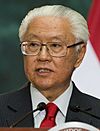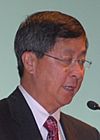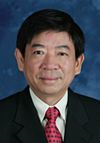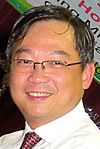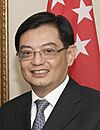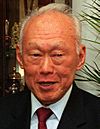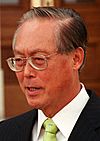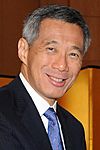People's Action Party facts for kids
Quick facts for kids
People's Action Party
|
|
|---|---|
 |
|
| Malay name | Parti Tindakan Rakyat |
| Chinese name | 人民行动党 Rénmín Xíngdòng Dǎng |
| Tamil name | மக்களின் செயல் கட்சி Makkaḷin Ceyal Kaṭci |
| Abbreviation | PAP |
| Chairman | Heng Swee Keat |
| Secretary-General | Lee Hsien Loong |
| Vice Chairman | Masagos Zulkifli |
| Deputy Secretary-General | Lawrence Wong |
| Assistant Secretaries-General |
|
| Founders |
|
| Founded | 21 November 1954 |
| Preceded by | Malayan Forum |
| Succeeded by |
|
| Headquarters | Block 57B New Upper Changi Road #01-1402 Singapore 463057 |
| Youth wing | Young PAP |
| Ideology |
|
| Political position | Centre-right |
| Colours | White, red, blue |
| Slogan | Our Lives, Our Jobs, Our Future |
| Governing body | Central Executive Committee |
| Parliament |
79 / 103
|
The People's Action Party (PAP) is a major conservative political party of the centre-right in Singapore. It is one of the three contemporary political parties represented in the Parliament of Singapore, alongside the Workers' Party (WP) and the Progress Singapore Party (PSP).
Initially founded as a traditional centre-left party in 1954, the leftist faction was soon expelled in 1961 by Prime Minister Lee Kuan Yew in the midst of Singapore's merger with Malaysia, desiring to move the party's ideology towards the centre after its first electoral victory in 1959. Beginning in the 1960s, the party began to move towards the centre-right. Following the 1965 agreement which led to Singapore's independence from Malaysia, the entire opposition boycotted the general elections in 1968, except for the Worker's Party, which won no seats in the election. For decades thereafter, the PAP exercised exclusivity over its governance of national institutions and become the largest political party in the country.
From 1965 to 1981, the PAP was the only political force represented in Parliament until it saw its first electoral defeat to the WP at a by-election in the constituency of Anson. Nevertheless, the PAP has not seen its hegemony threatened and has always received over 60% of the votes and 80% of the seats in every subsequent general election. Having governed for over six decades, the PAP is the longest uninterrupted governing party among modern multiparty parliamentary democracies. It is the second-longest governing party in history after Mexico's Institutional Revolutionary Party (PRI), which led for 71 years from 1929 to 2000.
Positioned on the centre-right of Singapore politics, the PAP is ideologically socially conservative and economically liberal. The party generally favours free-market economic policies, having turned Singapore's economy into one of the world's freest and most open, but has at times engaged in state interventionism reminiscent of welfarism. The party has supported the creation of state-owned enterprises, known locally as government-linked corporations. This was done in order to jumpstart industrialisation, spearhead economic development and lead to economic growth, primarily job creation, in various sectors of the Singaporean economy. Socially, the PAP supports communitarianism and civic nationalism. The cohesion of the country's main ethnic groups into a single Singaporean national identity forms the basis of many of its social policies. On foreign policy, it favours maintaining a strong and robust military, serving as a purportedly indispensable guarantor of the country's continued sovereignty within the context of its strategic position for international finance and trade.
Contents
History

Lee Kuan Yew, Toh Chin Chye and Goh Keng Swee were involved in the Malayan Forum, a London-based student activist group that was against colonial rule in Malaya in the 1940s and early 1950s. Upon returning to Singapore, the group met regularly to discuss approaches to attain independence in Malayan territories and started looking for like-minded individuals to start a political party. Journalist S. Rajaratnam was introduced to Lee by Goh. Lee was also introduced to several English-educated left-wing students and Chinese-educated union and student leaders while working on the Fajar sedition trial and the National Service riot case.
Formation
The PAP was officially registered as a political party on 21 November 1954. Convenors of the party include a group of trade unionists, lawyers and journalists such as Lee Kuan Yew, Abdul Samad Ismail, Toh Chin Chye, Devan Nair, S. Rajaratnam, Chan Chiaw Thor, Fong Swee Suan, Tann Wee Keng and Tann Wee Tiong. The political party was led by Lee Kuan Yew as its secretary-general, with Toh Chin Chye as its founding chairman. Other party officers include Tann Wee Tiong, Lee Gek Seng, Ong Eng Guan and Tann Wee Keng.
The PAP first contested the 1955 general election in which 25 of 32 seats in the legislature were up for election. In this election, the PAP's four candidates gained much support from the trade union members and student groups such as the University Socialist Club, who canvassed for them. The party won three seats, one by its leader Lee Kuan Yew for the Tanjong Pagar division and one by PAP co-founder Lim Chin Siong for the Bukit Timah division. Then 22 years old unionist Lim Chin Siong was and remained the youngest Assemblyman ever to be elected to office. The election was won by the Labour Front headed by David Marshall.
In April 1956, Lim and Lee represented the PAP at the London Constitutional Talks along with Chief Minister David Marshall which ended in failure as the British declined to grant Singapore internal self-government. On 7 June 1956, Marshall, disappointed with the constitutional talks, stepped down as Chief Minister as he had pledged to do so earlier if self-governance was not achieved. He was replaced by Lim Yew Hock, another Labour Front member. Lim pursued a largely anti-communist campaign and managed to convince the British to make a definite plan for self-government. The Constitution of Singapore was revised accordingly in 1958, replacing the Rendel Constitution with one that granted Singapore self-government and the ability for its own population to fully elect its Legislative Assembly.
PAP and left-wing members who were communists were criticised for inciting riots in the mid-1950s. Lim Chin Siong, Fong Swee Suan and Devan Nair as well as several unionists were detained by the police after the Chinese middle schools riots. Lim Chin Siong was placed under solitary confinement for close to a year, away from his other PAP colleagues, as they were placed in the Medium Security Prison (MSP) instead.
The number of PAP members imprisoned rose in August 1957, when PAP members from the trade unions (viewed as "communist or pro-communist") won half the seats in the Central Executive Committee (CEC). The "moderate" CEC members, including Lee Kuan Yew, Toh Chin Chye and others, refused to take their appointments in the CEC. Yew Hock's government again made a sweeping round of arrests, imprisoning all the "communist" members, before the "moderates" re-assumed their office.
Following this, the PAP decided to re-assert ties with the labour faction of Singapore in the hope of securing the votes of working-class Chinese Singaporeans, many of whom were supporters of the jailed unionists. Lee Kuan Yew convinced the incarcerated union leaders to sign documents to state their support for the party and its policies, promising to release the jailed members of the PAP when the party came to power in the next elections. Ex-Barisan Sosialis member Tan Jing Quee claims that Lee was secretly in collusion with the British to stop Lim Chin Siong and the labour supporters from attaining power because of their huge popularity. Quee also states that Lim Yew Hock deliberately provoked the students into rioting and then had the labour leaders arrested. Greg Poulgrain of Griffiths University argued that "Lee Kuan Yew was secretly a party with Lim Yew Hock in urging the Colonial Secretary to impose the subversives ban in making it illegal for former political detainees to stand for election". Lee Kuan Yew eventually accused Lim Chin Siong and his supporters of being communists working for the Communist United Front, but evidence of Lim being a communist cadre was a matter of debate as many documents have yet to be declassified.
First years in government
The PAP eventually won the 1959 general election under Lee Kuan Yew's leadership. The election was also the first one to produce a fully elected parliament and a cabinet wielding powers of full internal self-government. The party has won a majority of seats in every general election since then. Lee, who became the first Prime Minister, requested for the release of the PAP left-wing members to form the new cabinet.
Great Split of 1961
In 1961, disagreements on the proposed merger plan to form Malaysia and long-standing internal party power struggle led to the split of the left-wing group from the PAP.
Although the "Communist" faction had been frozen out of ever taking over the PAP, other problems had begun to arise internally. Ong Eng Guan, the former Mayor of the City Council after PAP's victory in the 1957 Singapore City Council election, presented a set of "16 Resolutions" to revisit some issues previously explored by Chin Siong's faction of the PAP: abolishing the PPSO, revising the Constitution, and changing the method of selecting cadre members.
Although Ong's 16 Resolutions originated from the left-wing faction led by Lim Chin Siong, that faction had only reluctantly asked the PAP leadership to clarify its position on them, as they still thought that the party with Lee Kuan Yew at the helm was a better alternative than Ong who was regarded as mercurial and a tyrant. However, Lee took the stance taken by the left-wing PAP members as a lack of confidence in his leadership. This issue caused a rift between the "moderate" PAP members (led by Lee) and the "left-wing" faction (led by Lim).
Ong was then expelled, and he resigned his Assembly seat to challenge the government to a by-election in Hong Lim in April 1961, where he won 73.3% of the vote. This was despite the fact that Lee Kuan Yew had made a secret alliance with Fong Chong Pik, the leader of the Communist Party of Malaya (CPM), to get the CPM cadres to support the PAP in the by-election.
Barisan Sosialis
The breakaway group of members formed the Barisan Sosialis with Lim Chin Siong as secretary-general. Aside from the Chinese union leaders, lawyers Thampoe Thamby Rajah and Tann Wee Tiong, several members from the University Socialist Club such as James Puthucheary and Poh Soo Kai joined the party. 35 of 51 branches of the PAP and 19 of 23 branch secretaries defected to Barisan.
Merger years 1963–1965
After gaining independence from Britain, Singapore joined the federation of Malaysia in 1963. Although the PAP was the ruling party in the state of Singapore, the PAP functioned as an opposition party at the federal level in the larger Malaysian political landscape. At that time and until the 2018 general election, the federal government in Kuala Lumpur was controlled by a coalition led by the United Malays National Organisation (UMNO). However, the prospect that the PAP might rule Malaysia agitated UMNO. The PAP's decision to contest federal parliamentary seats outside Singapore and the UMNO decision to contest seats within Singapore breached an unspoken agreement to respect each other's spheres of influence and aggravated PAP–UMNO relations. The clash of personalities between PAP leader Lee Kuan Yew and Malaysian Prime Minister Tunku Abdul Rahman resulted in a crisis and led to Rahman forcing Singapore to leave Malaysia on 9 August 1965. Upon independence, the nascent People's Action Party of Malaya, which had been registered in Malaysia on 10 March 1964, had its registration cancelled on 9 September 1965, just a month after Singapore's exit. Those with the now non-existent party applied to register People's Action Party, Malaya which was again rejected by the Malaysian government, before settling with the Democratic Action Party.
Post-independence, 1965 to present
The PAP has held an overwhelming majority of seats in the Parliament of Singapore since 1966, when the opposition Barisan Sosialis (Socialist Front) resigned from Parliament after winning 13 seats following the 1963 general election, which took place months after a number of their leaders had been arrested in Operation Coldstore based on accusations of being communists. It subsequently achieved a monopoly in an expanding parliament (winning every parliamentary seat) for the next four elections (1968, 1972, 1976 and 1980). Opposition parties returned to the legislature at a 1981 by-election. The 1984 general election was the first election in 21 years in which opposition parties won seats. From then until 2006, the PAP faced four opposition MPs at most. Opposition parties did not win more than four parliamentary seats from 1984 until 2011 when the Workers' Party won six seats and took away a Group Representation Constituency (GRC) for the first time for any opposition party.
Even so, it still holds a supermajority in the legislature, to the point that Singapore is effectively a dominant party system. With its supermajority, the PAP has always had the ability to amend the Constitution of Singapore without much obstruction, including the introduction of multi-member constituencies under the Group representation constituency (GRC) system or Nominated Member of Parliament (NMPs), which has helped strengthened the government's dominance and control of Parliament.
Leadership transitions
The longtime governing party of Singapore, spans both past and present, but notably occurred in the mid-1980s where the first generation of PAP leaders in the CEC and the Cabinet of Singapore ceded power to a second generation of leaders.
First to second generation
By 1984, the "old guard" (first generation of party leaders) had been governing Singapore for approximately a quarter of a century. Aging leadership was a key concern, and then Prime Minister of Singapore, Lee Kuan Yew sought to groom younger leaders. In a speech on 29 September 1984, Lee argued that though the first generation of leaders was still "alert and fully in charge", to hang on to power until they had become feeble would allow power to be wrested from them, with no say in who their successors were.
On 30 September, at the Ordinary Party Conference, power was transferred to the second generation of leaders, who were elected to the Central Executive Committee in place of all the old CEC members; of the 14-member CEC, only Lee Kuan Yew remained the only "old guard" leader.
According to a report to the Library of Congress, the old guard were confident in their "rectitude" and discretion in using their extensive political powers for Singapore's common good, but were not as confident in the next generation in doing so. Various limits on executive power were considered, in order to minimise the chances of corruption. These included a popularly elected President of Singapore with substantial, nonceremonial powers. This particular reform was enacted with a constitutional amendment in 1991.
The old guard also sought to eschew the use of PAP as a central political institution, seeking to "depoliticise" and disperse power among society, and sought to include low-level community leaders in government. A policy of cross-fertilisation was enacted: exchange of leaders, "elites" and talent would take place between private and government sectors, civilian and military segments of society, and between the party and the National Trades Union Congress.
Second to third generation
The next generation of leaders in the late 1980s was split between the factions of then Brigadier General Lee Hsien Loong and the older, more-experienced Goh Chok Tong. Lee Hsien Loong was supported by bureaucrats in the Ministry of Defence and army colleagues in the Singapore Armed Forces; Goh Chok Tong had more influence in the Singapore Civil Service, the Cabinet and government-linked companies.
Lee Kuan Yew himself remained Prime Minister and in the CEC until 1990, when he stepped down in favour of Goh Chok Tong as PM. Lee Hsien Loong became PM in 2004.
Third to fourth generation
On 23 November 2018, fourth-generation leadership members, then–Minister for Finance Heng Swee Keat and then Minister for Trade and Industry Chan Chun Sing were elected as the First and Second Assistant Secretaries-General respectively, the second and third highest positions of the party. They had replaced then Assistant Secretaries-General Teo Chee Hean and Tharman Shanmugaratnam. A significant step of the leadership transition from the third-generation leaders to the fourth-generation leaders.
On 1 May 2019, Heng Swee Keat was appointed the new and sole Deputy Prime Minister, replacing Teo and Tharman. He was then widely seen as the 4th and next Prime Minister and Secretary-General of PAP succeeding incumbent Lee Hsien Loong. However on 8 April 2021, Heng surprisingly announced he would step down as the fourth-generation leader and step aside to pave way for younger and healthier leaders to take over the leadership and stressed that health and age as concerns of this decision. After his decision, several Cabinet members were seen as the possible candidates to succeed Heng, ranging from Minister for Finance Lawrence Wong, Minister for Health Ong Ye Kung, Minister for Education Chan Chun Sing.
On 14 April 2022, Finance Minister Lawrence Wong was selected as the new leader of the PAP's fourth-generation (4G) team, succeeding Deputy Prime Minister Heng Swee Keat who had stepped down as 4G leader. Wong received an "overwhelming majority" of support in the consultation process, surpassing that of other nominees. His candidacy was unanimously endorsed by the cabinet and subsequently, by the PAP MPs at a party caucus on 14 April.
Organisation
During its initial years, the party had adopted a traditional Leninist form of party organisation, together with a vanguard cadre from its labour-leaning faction. The PAP Executive later expelled the leftist faction in 1961, bringing the ideological basis of the party into the centre and later in the 1960s moving further to the right.
In the beginning, there were about 500 so-called temporary cadres appointed, however the current number of cadres is unknown, with the register of cadres being kept confidential. In 1988, Wong Kan Seng revealed that there were more than 1,000 cadres.
Cadre members have the right to attend party conferences and to vote for and elect and to be elected into the Central Executive Committee (CEC), the pinnacle of party leaders.
To become a cadre, a party member must be first nominated by the MP in their branch. The candidate will then undergo three sessions of interview, each with four to five ministers or MPs and the appointment is then made by the CEC. About 100 candidates are nominated each year.
Central Executive Committee and Secretary-General
Political power in the party is concentrated in the CEC, led by the secretary-general. The secretary-general of the PAP is the leader of the party. Due to PAP's electoral victories in every general election since 1959, the prime minister of Singapore has been by convention the secretary-general of the PAP since 1959. Key appointments in the CEC are usually Cabinet members.
From 1957 onward, the rules laid down that the outgoing CEC should recommend a list of candidates from which the cadre members can then vote for the next CEC. This has recently changed so that the CEC nominates eight members and the party caucus selects the remaining ten.
Historically, the position of Secretary-General was not considered for the office of Prime Minister, but rather the Central Executive Committee held an election to choose the prime minister. There was a contest between PAP Secretary-General Lee Kuan Yew and PAP Treasurer Ong Eng Guan, prior to 1959. Lee subsequently won the leadership and was inaugurated as the first prime minister of Singapore.
HQ Executive Committee
The next lower level committee is the HQ Executive Committee (HQ EXCO) which performs the party's administration and oversees 14 sub-committees.
The sub-committees are the following:
- Branch Appointments and Relations
- Constituency Relations
- Information and Feedback
- New Media
- Malay Affairs
- Membership Recruitment and Cadre Selection
- PAP Awards
- Political Education
- Publicity and Publication
- Social and Recreational
- Women's Wing (WW)
- Young PAP (YP)
- PAP Seniors Group (PAP.SG)
- PAP Policy Forum (PPF)
Young PAP and internet presence
The Young PAP is the youth-wing of the party, serving as a youth organisation for young adults and students in Singapore who support the PAP and have an interest in politics. The incumbent chairman of the youth-wing is Janil Puthucheary. The YP's predecessor, the PAP Youth Committee, was established in 1986, under Lee Hsien Loong's tenure as Chairman. All PAP members under the age of 35 had then been grouped under the Youth Committee. In 1993, the Youth Committee was renamed the Young PAP. In an effort to attract members, then Chairman George Yeo said that people joining the YP could take positions different from central party leadership. The age limit was raised from 35 to 40. Memberships are issued through the PAP branches under each constituency in Singapore. By 2005, the committee had grown to more than 6,000 members. In 2010, then Vice-Chairman Zaqy Mohamad said the YP attracts over 1200 new members that year, an increase on the 1000 new members in 2009.
Since 1995, the youth-wing of the PAP has had an internet presence that aims to "correct 'misinformation' about Singapore politics or culture". Under the urging of then Minister for Information and the Arts George Yeo, Young PAP took charge of running several online websites to create an online presence for the party. After popular forum Sintercom was shut down in 2001, the Young PAP offered their own forum for moderated discussions. They have since set up various blogs and social media accounts with multimedia content to engage the masses.
In February 2007, it was reported by The Straits Times that the PAP's new media committee chaired by Minister Ng Eng Hen, had initiated an effort to counter critics anonymously on the Internet "as it was necessary for the PAP to have a voice on cyberspace". The initiative was divided by two sub-committees, one of which was in charge of strategising the campaigns and is co-headed by Minister Lui Tuck Yew and MP Zaqy Mohamad. The other sub-committee—new media capabilities group led by MPs Baey Yam Keng and Josephine Teo executed the strategies. The initiative was set up after the 2006 general election and also included around 20 IT-savvy PAP activists.
Ideology
Asian democracy
Professor Hussin Mutalib from the National University of Singapore (NUS) opines that the PAP has often set forth the idea of Asian democracy and values, drawing from a notion of Asian culture and Confucianism to construct ideological bulwarks against Western democracy. He added that for founding prime minister Lee Kuan Yew, "Singapore would be better off without Western-style liberal democracy".
Consequently, the governance of the PAP has occasionally been characterised by some observers, especially in the West, as "semi-authoritarian" or "nanny-like" by "liberal democratic standards". According to Professor Kenneth Paul Tan from the NUS, the PAP proclaim that many Singaporeans continue to vote for the party as economic considerations, pragmatism and stability triumph over accountability and checks and balances by opposition parties.
Economic policies
The party economic ideology has always accepted the need for some welfare spending, and pragmatic economic interventionism. However, free-market policies have been popular since the 1980s as part of the wider implementation of a meritocracy in civil society and Singapore frequently ranks extremely highly on indices of economic freedom published by economically liberal organisations such as the World Bank and the International Monetary Fund. Singapore is also the only Asian country with the top AAA sovereign rating from the "Big Three" credit rating agencies of S&P, Moody's and Fitch.
Lee Kuan Yew once said in 1992: "Through Hong Kong watching, I concluded that state welfare and subsidies blunted the individual's drive to succeed. I watched with amazement the ease with which Hong Kong workers adjusted their salaries upwards in boom times and downwards in recessions. I resolved to reverse course on the welfare policies which my party had inherited or copied from British Labour Party policies".
Notably, since Singapore’s independence in 1965, the party has also supported the creation of state-owned enterprises, known within Singapore as Government-linked Corporations (GLCs), in order to jumpstart industrialisation, spearhead economic development and lead to economic growth (primarily job creation) in various sectors of the Singaporean economy as there was a lack of private sector funds and expertise, particularly in the early years of nationhood. Various GLCs were formed to pursue strategic sectors such as in ship building and repair (Sembcorp Marine, Keppel Corporation), aviation and defence (Singapore Airlines, ST Engineering), telecommunications (Singtel), real estate (CapitaLand) and development finance (DBS Bank) amongst others. In addition, various GLCs were set up as private-public partnerships, notable as joint ventures or strategic alliances with foreign companies or investors with relevant expertise, particularly in the petrochemicals and oil refining industries.
Social policies
Since the early years of the PAP's rule, the idea of survival as a small and vulnerable country with hostile neighbours has been a central theme of Singaporean politics. According to Diane Mauzy and R. S. Milne, most analysts of Singapore have discerned four major ideologies of the PAP, namely pragmatism, meritocracy, multiracialism and Asian values/communitarianism.
In January 1989, then President Wee Kim Wee in his opening address to the 7th Parliament of Singapore stated that Singapore must adopt a set of shared national values. He was of the view that a national ideology was useful to bond Singaporeans together by preserving the cultural heritage of the core communities of Singapore, and upholding certain common values that would capture the essence of being a Singaporean. In response, the government set up a committee as a follow up to Wee's prosposal, and in January 1991, the PAP formally introduced a white paper on "Shared Values" for the country, which consists of five national values to forge a national identity. These values were – nation before community and society above self; family as the basic unit of society; regard and community support for the individual; consensus instead of contention, and racial and religious harmony. They were also set as a contrast against the "more Westernised, individualistic, and self-centred outlook on life" and to uphold the "traditional Asian ideas of morality, duty and society".
At an Institute of Policy Studies (IPS) dialogue held on 2 July 2015 and chaired by Fareed Zakaria, Prime Minister Lee Hsien Loong spoke about the need to maintain a Jeffersonian natural aristocracy in the system to instill a culture of respect and to avoid anarchy. In November 2019, Lee stated at a party convention that the PAP must not allow the "disconnect between the masses and the elite seen in other countries to take root in Singapore." During the election campaign in July 2020, Lee's estranged brother over 38 Oxley Road, Lee Hsien Yang, accused the PAP of elitism as one of his expanations of joining the Progress Singapore Party (PSP).
Views on other ideologies
The party is deeply suspicious of communist political ideologies despite a brief joint alliance with the pro-labour co-founders of the PAP during the party's early years, who were eventually accused of being communists. In 2015, the party was seen by some observers to have adopted a left-of-centre tack in certain areas in order to remain electorally dominant.
The socialism practised by the PAP during its first few decades in power was of a pragmatic kind as characterised by the party's rejection of nationalisation. According to Chan Heng Chee, by the late 1970s the intellectual credo of the government rested explicitly upon a philosophy of self-reliance, similar to the rugged individualism of the American brand of capitalism. Despite this, the PAP still claimed to be a socialist party, pointing out its regulation of the private sector, activist intervention in the economy and social policies as evidence of this. In 1976, the PAP formally resigned from the Socialist International (SI) after the Dutch Labour Party had initially proposed to expel the PAP on allegations of indefinite detention of political prisoners, alluding to Chia Thye Poh.
Symbolism
The PAP symbol, which is a red thunderbolt and blue circle on white, stands for action inside multicultural unity. It also appears on party flags on parades. PAP members at party rallies have customarily worn a uniform of white shirts and white trousers which symbolises incorruptibility and purity of the party's ideologies of the government.
Leadership
List of chairmen
| Portrait | Name (birth–death) |
Term of office | Time in office | |
|---|---|---|---|---|
| Toh Chin Chye (10 December 1921 – 3 February 2012) |
21 November 1954 | 5 January 1981 | 26 years, 45 days | |
| Ong Teng Cheong (22 January 1936 – 8 February 2002) |
5 January 1981 | 16 August 1993 |
12 years, 223 days | |
| Tony Tan (born 7 February 1940) |
1 September 1993 | 3 December 2004 | 11 years, 93 days | |
| Lim Boon Heng (born 18 November 1947) |
3 December 2004 | 1 June 2011 | 6 years, 180 days | |
| Khaw Boon Wan (born 8 December 1952) |
1 June 2011 | 23 November 2018 | 7 years, 175 days | |
| Gan Kim Yong (born 9 February 1959) |
23 November 2018 | 26 November 2022 | 4 years, 3 days | |
| Heng Swee Keat (born 15 April 1961) |
26 November 2022 | Incumbent | 2 years, 151 days | |
List of secretaries-general
| Portrait | Name (birth–death) |
Term of office | Time in office | Refs | |
|---|---|---|---|---|---|
| Lee Kuan Yew (16 September 1923 – 23 March 2015) |
21 November 1954 | 3 August 1957 | 2 years, 255 days | ||
| T. T. Rajah (28 December 1919 – 13 March 1996) |
13 August 1957 | 3 September 1957 | 21 days | ||
| Lee Kuan Yew (16 September 1923 – 23 March 2015) |
20 October 1957 | 14 November 1992 | 35 years, 25 days | ||
| Goh Chok Tong (born 20 May 1941) |
15 November 1992 | 6 November 2004 | 11 years, 357 days | ||
| Lee Hsien Loong (born 10 February 1952) |
7 November 2004 | Incumbent | 20 years, 170 days | ||
Central Executive Committee
As of 30 July 2023, the Central Executive Committee comprises the following members:
| Title | Name |
|---|---|
| Chairman | Heng Swee Keat |
| Vice-Chairman | Masagos Zulkifli |
| Secretary-General | Lee Hsien Loong |
| Deputy Secretary-General | Lawrence Wong |
| Assistant Secretaries-General | Chan Chun Sing |
| Desmond Lee | |
| Treasurer | K. Shanmugam |
| Assistant Treasurer | Ong Ye Kung |
| Organising Secretaries | Grace Fu |
| Edwin Tong | |
| Members | Alex Yeo |
| Cheryl Chan | |
| Indranee Rajah | |
| Josephine Teo | |
| Ng Chee Meng | |
| Tan See Leng | |
| Vivian Balakrishnan |
Current Members of Parliament
Single Member Constituency
| Name | Constituency |
|---|---|
| Murali Pillai | Bukit Batok SMC |
| Liang Eng Hwa | Bukit Panjang SMC |
| Amy Khor | Hong Kah North SMC |
| Henry Kwek | Kebun Baru SMC |
| Tin Pei Ling | MacPherson SMC |
| Gan Siow Huang | Marymount SMC |
| Lim Biow Chuan | Mountbatten SMC |
| Patrick Tay | Pioneer SMC |
| Sitoh Yih Pin | Potong Pasir SMC |
| Sun Xueling | Punggol West SMC |
| Melvin Yong | Radin Mas SMC |
| Yip Hon Weng | Yio Chu Kang SMC |
| Grace Fu | Yuhua SMC |
4 Member Group Constituency
| Name | Constituency | Division |
|---|---|---|
| Ng Eng Hen | Bishan–Toa Payoh GRC | Toa Payoh Central |
| Chee Hong Tat | Toa Payoh West – Thomson | |
| Chong Kee Hiong | Bishan East – Thomson | |
| Saktiandi Supaat | Toa Payoh East – Novena | |
| Gan Kim Yong | Chua Chu Kang GRC | Choa Chu Kang |
| Low Yen Ling | Bukit Gombak | |
| Don Wee Boon Hong | Brickland | |
| Zhulkarnain Abdul Rahim | Keat Hong | |
| Vivian Balakrishnan | Holland–Bukit Timah GRC | Cashew |
| Sim Ann | Bukit Timah | |
| Christopher de Souza | Ulu Pandan | |
| Edward Chia | Zhenghua | |
| Josephine Teo | Jalan Besar GRC | Kreta Ayer – Kim Seng |
| Heng Chee How | Whampoa | |
| Denise Phua | Kampong Glam | |
| Wan Rizal Wan Zakariah | Kolam Ayer | |
| Lawrence Wong | Marsiling–Yew Tee GRC | Limbang |
| Alex Yam | Yew Tee | |
| Zaqy Mohamad | Marsiling | |
| Hany Soh | Woodgrove |
5 Member Group Constituency
| Name | Constituency | Division |
|---|---|---|
| Lee Hsien Loong | Ang Mo Kio GRC | Teck Ghee |
| Darryl David | Ang Mo Kio – Hougang | |
| Nadia Ahmad Samdin | Cheng San – Seletar | |
| Ng Ling Ling | Jalan Kayu | |
| Gan Thiam Poh | Fernvale | |
| Heng Swee Keat | East Coast GRC | Bedok |
| Maliki Osman | Siglap | |
| Tan Kiat How | Kampong Chai Chee | |
| Cheryl Chan | Fengshan | |
| Jessica Tan | Changi – Simei | |
| Tan Wu Meng | Jurong GRC | Clementi |
| Rahayu Mahzam | Bukit Batok East | |
| Shawn Huang Wei Zhong | Jurong Spring | |
| Xie Yao Quan | Jurong Central | |
| Edwin Tong | Marine Parade GRC | Joo Chiat |
| Seah Kian Peng | Braddell Heights | |
| Tan See Leng | Marine Parade | |
| Mohd Fahmi Aliman | Geylang Serai | |
| K. Shanmugam | Nee Soon GRC | Chong Pang |
| Carrie Tan | Nee Soon South | |
| Derrick Goh | Nee Soon Link | |
| Louis Ng | Nee Soon East | |
| Muhammad Faishal Ibrahim | Nee Soon Central | |
| Teo Chee Hean | Pasir Ris–Punggol GRC | Pasir Ris West |
| Janil Puthucheary | Pasir Ris Coast | |
| Mohamed Sharael Taha | Pasir Ris East | |
| Yeo Wan Ling | Punggol Shore | |
| Desmond Tan | Pasir Ris Central | |
| Ong Ye Kung | Sembawang GRC | Sembawang Central |
| Vikram Nair | Admiralty | |
| Lim Wee Kiak | Canberra | |
| Poh Li San | Sembawang West | |
| Mariam Jaafar | Woodlands | |
| Masagos Zulkifli | Tampines GRC | Tampines West |
| Baey Yam Keng | Tampines North | |
| Desmond Choo | Tampines Changkat | |
| Koh Poh Koon | Tampines Central | |
| Chan Chun Sing | Tanjong Pagar GRC | Buona Vista |
| Indranee Rajah | Tanjong Pagar – Tiong Bahru | |
| Joan Pereira | Henderson – Dawson | |
| Eric Chua | Queenstown | |
| Alvin Tan | Moulmein – Cairnhill | |
| Desmond Lee | West Coast GRC | Boon Lay |
| Foo Mee Har | Ayer Rajah – Gek Poh | |
| Ang Wei Neng | Nanyang | |
| Rachel Ong Sin Yen | Telok Blangah |
- Tan Chuan Jin and Cheng Li Hui resigned from the PAP, Speaker of the Parliament and as a Member of Parliament on 17 July 2023.
- S. Iswaran has been suspended since 12 July 2023 pending a Corrupt Practices Investigation Bureau (CPIB) investigation and resigned from the PAP, Transport Minister and as a Member of Parliament on 18 January 2024, after being 27 counts of corruption and bribery.
Electoral history
Legislative Assembly
| Election | Seats up for election | Seats contested by party | Seats won by walkover | Contested seats won | Contested seats lost | Total seats won | Change | Total votes | Share of votes | Resulting government | Party leader |
|---|---|---|---|---|---|---|---|---|---|---|---|
| 1955 | 25 | 4 | 0 | 3 | 1 |
3 / 25
|
13,634 | 8.7% | Opposition | Lee Kuan Yew | |
| 1959 | 51 | 51 | 0 | 43 | 8 |
43 / 51
|
281,891 | 54.1% | Supermajority | ||
| 1963 | 51 | 51 | 0 | 37 | 14 |
37 / 51
|
272,924 | 46.9% | Supermajority |
- Legislative Assembly by-elections
| Election | Seats up for election | Seats contested by party | Contested seats won | Contested seats lost | Total votes | Share of votes | Outcome of election | Constituency contested | Party leader |
|---|---|---|---|---|---|---|---|---|---|
| 1957 | 2 | 1 | 1 | 0 | 4,707 | 37.0% | 1 seat hold | Tanjong Pagar SMC | Lee Kuan Yew |
| 1961 | 2 | 2 | 0 | 2 | 5,872 | 31.1% | 1 seat lost to Independent, 1 seat lost to WP | Anson SMC Hong Lim SMC |
|
| 1965 | 1 | 1 | 0 | 1 | 6,398 | 59.5% | 1 seat gained from UPP | Hong Lim SMC |
Malaysian Parliament
| Election | Seats up for election | Seats contested by party | Seats won by walkover | Contested seats won | Contested seats lost | Total seats won | Change | Total votes | Share of votes | Resulting government | Party leader |
|---|---|---|---|---|---|---|---|---|---|---|---|
| 1964 | 144 | 11 | 0 | 1 | 10 |
1 / 144
|
42,130 | 2.0% | Opposition | Lee Kuan Yew |
Parliament
| Election | Seats up for election | Seats contested by party | Seats won by walkover | Contested seats won | Contested seats lost | Total seats won | Change | Total votes | Share of votes | Resulting government | Party leader |
|---|---|---|---|---|---|---|---|---|---|---|---|
| 1968 | 58 | 58 | 51 | 7 | 0 |
58 / 58
|
65,812 | 86.7% | Won all seats | Lee Kuan Yew | |
| 1972 | 65 | 65 | 8 | 57 | 0 |
65 / 65
|
524,892 | 70.4% | Won all seats | ||
| 1976 | 69 | 69 | 16 | 53 | 0 |
69 / 69
|
590,169 | 74.1% | Won all seats | ||
| 1980 | 75 | 75 | 37 | 38 | 0 |
75 / 75
|
494,268 | 77.7% | Won all seats | ||
| 1984 | 79 | 79 | 30 | 47 | 2 |
77 / 79
|
568,310 | 64.8% | Supermajority | ||
| 1988 | 81 | 81 | 11 | 69 | 1 |
80 / 81
|
848,029 | 63.2% | Supermajority | ||
| 1991 | 81 | 81 | 41 | 36 | 4 |
77 / 81
|
477,760 | 61.0% | Supermajority | Goh Chok Tong | |
| 1997 | 83 | 83 | 47 | 34 | 2 |
81 / 83
|
465,751 | 65.0% | Supermajority | ||
| 2001 | 84 | 84 | 55 | 27 | 2 |
82 / 84
|
470,765 | 75.3% | Supermajority | ||
| 2006 | 84 | 84 | 37 | 45 | 2 |
82 / 84
|
748,130 | 66.6% | Supermajority | Lee Hsien Loong | |
| 2011 | 87 | 87 | 5 | 76 | 6 |
81 / 87
|
1,212,514 | 60.14% | Supermajority | ||
| 2015 | 89 | 89 | 0 | 83 | 6 |
83 / 89
|
1,576,784 | 69.86% | Supermajority | ||
| 2020 | 93 | 93 | 0 | 83 | 10 |
83 / 93
|
1,524,781 | 61.24% | Supermajority |
- Parliamentary by-elections
| Election | Seats up for election | Seats contested by party | Seats won by walkover | Contested seats won | Contested seats lost | Total votes | Share of votes | Outcome of election | Constituency contested | Party leader |
|---|---|---|---|---|---|---|---|---|---|---|
| 1966 | 7 | 7 | 6 | 1 | 0 | 9,082 | 82.9% | 7 seats gained from BS | Bukit Merah SMC Bukit Timah SMC Chua Chu Kang SMC Crawford SMC Joo Chiat SMC Jurong SMC Paya Lebar SMC |
Lee Kuan Yew |
| 1967 | 5 | 5 | 4 | 1 | 0 | 9,407 | 83.6% | 5 seats gained from BS | Bukit Panjang SMC Havelock SMC Jalan Kayu SMC Tampines SMC Thomson SMC |
|
| 1970 | 5 | 5 | 3 | 2 | 0 | 14,545 | 69.9% | 5 seats hold | Delta SMC Havelock SMC Kampong Kapor SMC Ulu Pandan SMC Whampoa SMC |
|
| 1979 | 7 | 7 | 2 | 5 | 0 | 53,222 | 72.7% | 7 seats hold | Anson SMC Geylang West SMC Mountbatten SMC Nee Soon SMC Potong Pasir SMC Sembawang SMC Telok Blangah SMC |
|
| 1981 | 1 | 1 | 0 | 0 | 1 | 6,359 | 47.1% | 1 seat lost to WP | Anson SMC | |
| 1992 | 4 | 4 | 0 | 4 | 0 | 48,965 | 72.9% | 4 seats hold | Marine Parade GRC | Goh Chok Tong |
| 2012 | 1 | 1 | 0 | 0 | 1 | 8,223 | 37.9% | No seat | Hougang SMC | Lee Hsien Loong |
| 2013 | 1 | 1 | 0 | 0 | 1 | 12,856 | 43.7% | 1 seat lost to WP | Punggol East SMC | |
| 2016 | 1 | 1 | 0 | 1 | 0 | 14,428 | 61.21% | 1 seat hold | Bukit Batok SMC |
See also
 In Spanish: Partido de Acción Popular para niños
In Spanish: Partido de Acción Popular para niños
- PAP Community Foundation
- Party Whip of the People's Action Party
- Politics of Singapore
- List of political parties in Singapore





